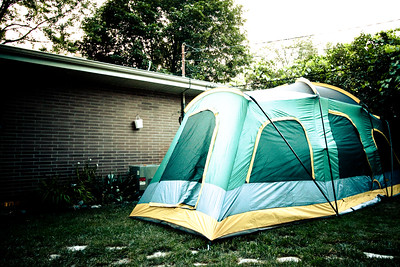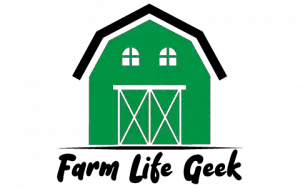Yes, you can live in a tent on your own land. You may need to obtain a permit from your local zoning office or building department first. Check with your local laws before pitching a tent on your property.
- Assuming you already have the land: 1
- Choose a level spot for your tent and clear away any rocks or debris
- Spread out a tarp to create an additional layer between the ground and your tent floor
- Set up your tent on top of the tarp
- If there is rain in the forecast, consider adding a tarp above your tent for extra protection from the elements
- Create a makeshift kitchen area by setting up a camp stove or fire pit outside of your tent
- Store food and other supplies in airtight containers to keep critters out
- Use battery-operated lights inside your tent at night instead of candles or lanterns to avoid attracting insects
We live in a tent on our 40 acres of off grid Arizona land.
Where Can You Live in a Tent Year Round
For some people, living in a tent year-round is the only way they can afford to live. For others, it’s a choice that allows them to live a more simple life. Either way, there are a few things you need to know if you plan on making this your permanent home.
First, you need to find a place where you can camp legally. This may seem obvious, but many people don’t realize that not all public lands allow camping. Check with your local government to see what the laws are in your area.
Second, you need to make sure your tent is weatherproof and comfortable. A good quality four-season tent will be your best bet for surviving all types of weather conditions. You should also invest in a comfortable sleeping bag and pad so you can get a good night’s sleep no matter what the temperature is outside.
Third, you need to have a plan for how you’ll handle basic needs like food and water. If you’re near civilization, then this won’t be as big of an issue since you can always restock when necessary. However, if you’re planning on living in more remote areas, then it’s important to have a plan for sourcing these essentials yourself.
This could mean anything from collecting rainwater to hunting and fishing for food.
Finally, remember that living in a tent year-round isn’t for everyone – but it could be perfect for YOU! If you enjoy being close to nature and relish the idea of simplifying your life, then give it shot!
Where Can I Live in a Tent for Free
Assuming you would like a blog post discussing locations in the United States where one could live in a tent for free:
There are many reasons why someone might want to live in a tent. It could be for financial reasons, an adventurous lifestyle, or simply because they prefer to live closer to nature.
Whatever the reason, there are plenty of places in the United States where it is possible to set up camp and live in a tent without having to worry about being chased off by authorities or spending a fortune on rent. Here are five of the best places to consider if you’re thinking about living in a tent:
1. National Forests
One of the most obvious choices for living in a tent is on public land managed by the U.S. Forest Service. There are 155 national forests spanning across 43 states, so there’s bound to be one near you no matter where you live. In general, camping is allowed anywhere within national forests as long as it doesn’t damage natural resources or disturb wildlife – although there may be some exceptions depending on the specific forest regulations.
Be sure to check with the local ranger station before setting up camp to make sure you know all of the rules and regulations.
2. Bureau of Land Management Areas
The Bureau of Land Management (BLM) manages over 247 million acres of public lands across the country, making it another great option for those looking for somewhere to set up camp.
Like with national forests, camping is usually allowed on BLM land as long as it doesn’t damage natural resources or disturb wildlife. Again, it’s always best to check with the local BLM office before setting up camp so that you know all of the rules and regulations that apply to that specific area.
3. National Parks
While camping is typically not allowed inside national parks themselves, there are often designated campsites just outside park boundaries where tents can be set up (for a fee). These campsites usually have amenities like bathrooms and picnic tables, and some even offer showers and electric hookups if you really want creature comforts while roughing it outdoors. To find out if there are any campsites near your desired national park, just do a quick Google search or visit www.
Where Can You Legally Sleep in a Tent
Assuming you are talking about the United States, there are a few different places you can legally sleep in a tent. Of course, you can camp in an established campsite that is meant for camping. These will have fees associated with them and will likely have amenities like running water and bathrooms.
You can also get permits to camp in certain areas of national forests. dispersed camping is allowed in some areas of national forests as long as you follow the Leave No Trace principles and camp at least 200 feet away from any water source. Finally, boondocking on BLM land is another option for free camping, but be sure to check for signs prohibiting camping before setting up your tent!
Is It Legal to Live in a Tent With a Child
If you’re thinking about living in a tent with your child, you may be wondering if it’s legal. The answer is maybe. It depends on where you live and what the local laws are.
Some cities and states have laws that prohibit people from living in tents, while others don’t have any restrictions.
If you’re considering living in a tent with your child, it’s important to research the laws in your area before making any decisions. You don’t want to get caught breaking the law and end up getting evicted or worse.
In some cases, living in a tent with a child may not be the best option for their safety and well-being. If there are no other options available, however, it’s better than nothing.
If you do decide to live in a tent with your child, there are some things you can do to make the experience more comfortable and safe for them.
Make sure the tent is waterproof and has plenty of ventilation. Keep mosquito nets handy to protect against insects. And most importantly, always keep an eye on your child when they’re outside of the tent – there are many dangers lurking in nature that can harm them if they’re not careful.

Credit: www.boondockersbible.com
Can You Permanently Live in a Tent?
Yes, you can permanently live in a tent! There are actually quite a few people who choose to do this full-time. It’s a great way to save money on housing and live a more minimalist lifestyle.
Of course, there are some challenges that come with living in a tent full-time. For example, you’ll need to find a spot that has enough level ground to set up your tent and that isn’t too close to any potential hazards (flooding, wildlife, etc.). You’ll also need to be prepared for extreme weather conditions and make sure your tent is well-insulated and waterproof.
But if you’re up for the challenge, permanent tent living can be a rewarding experience!
Can You Camp on Your Own Property in California?
Yes, you can camp on your own property in California. There are a few things to keep in mind, though. First, you will need to check with your local zoning department to make sure that camping is allowed in the area where your property is located.
Second, you will need to obtain any necessary permits from the county or city in which your property is located. Finally, you will need to make sure that you have enough space on your property to accommodate a campsite, and that the campsite is at least 150 feet away from any water source.
Can I Set Up My Tent Anywhere?
There are a few things to consider when choosing a campsite for your tent.
First, you’ll want to make sure the site is level. This will help ensure that your tent stays upright and doesn’t collapse in on itself during the night.
You’ll also want to clear any potential hazards from the area where you’ll be pitching your tent. This means removing any large rocks or sticks that could puncture the bottom of your tent, and clearing away any branches that could fall and tear holes in your tent’s fabric.
Once you’ve found a level, hazard-free spot for your tent, you’ll need to stake it down.
Staking down your tent will secure it to the ground so that it doesn’t blow away in strong winds. To do this, simply drive stakes into the ground around the perimeter of your chosen campsite and then loop the cords or ropes that come with your tent around each stake. Be sure to tie these cords or ropes tightly so that they don’t come loose during the night.
Now you’re ready to set up your tent! Start by unrolling it so that all of its fabric is flat on the ground. Then, extend each of its poles until they’re at their full length and insert them into their corresponding loops or sleeves on the outside of the Tent body .
Once all of the poles are in place, start pulling up on corners of the Tent body until it’s fully upright; then, use more cord or rope to secure these corners (and any other parts of the Tent body) to nearby trees or rocks . Finally, zip up all open doors or windows and enjoy your new home away from home!
Can You Camp on Your Own Land in Oregon?
There are a few things to consider when thinking about camping on your own land in Oregon. First, you will need to check with your local county zoning regulations to see if camping is allowed in the area where your property is located. If it is not specifically allowed, you may still be able to camp on your land if it meets certain criteria set forth by the county.
Next, even if camping is allowed in your county, you will need to make sure that you have enough space on your property to accommodate a campsite. You will also need to ensure that there is access to water and toilets (if necessary). Additionally, you should consider any potential hazards on your property that could make camping unsafe (e.g., steep cliffs, poison oak/ivy, wildlife).
Assuming all of these things check out, then yes – you can camp on your own land in Oregon! Just remember to follow Leave No Trace principles so that you minimize impact on the environment and respect the rights of others.
Conclusion
If you want to live in a tent on your own land, there are a few things you need to know. First, check the zoning regulations in your area to make sure it is allowed. Second, get a permit if required.
Third, make sure you have enough money to pay for utilities and other necessary costs. Finally, be prepared for bad weather and other challenges that come with living in a tent.
